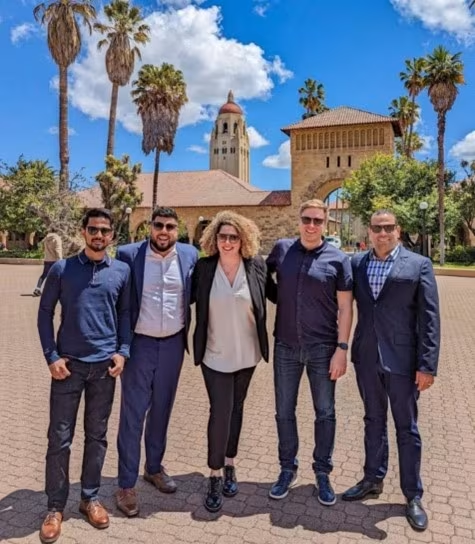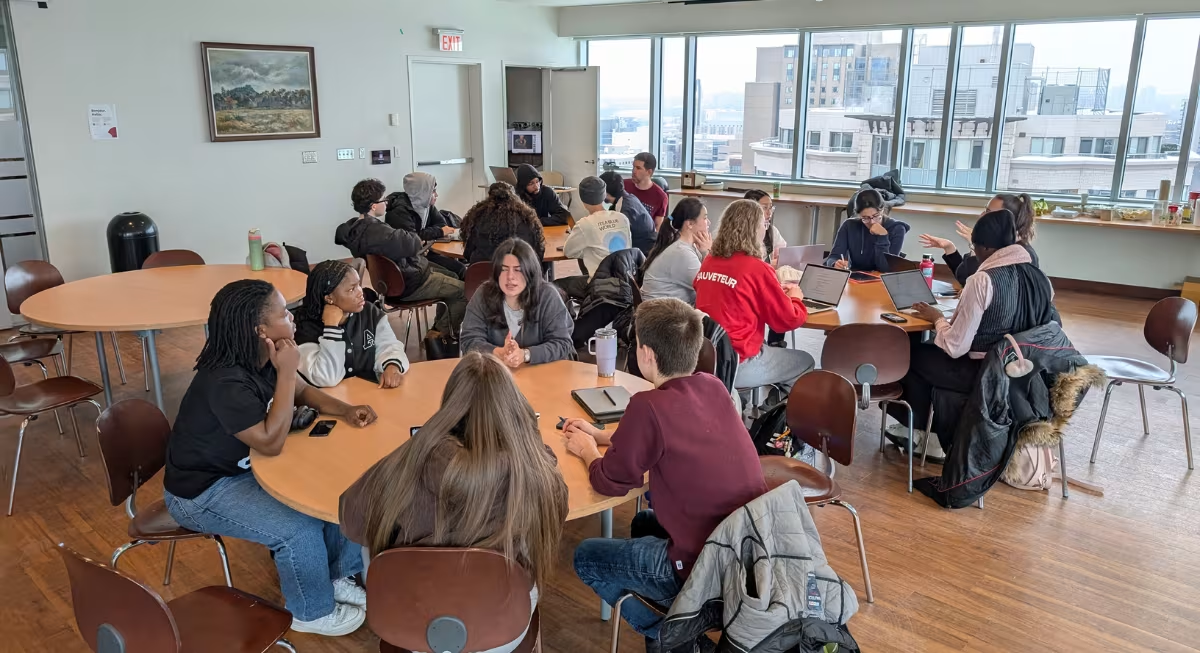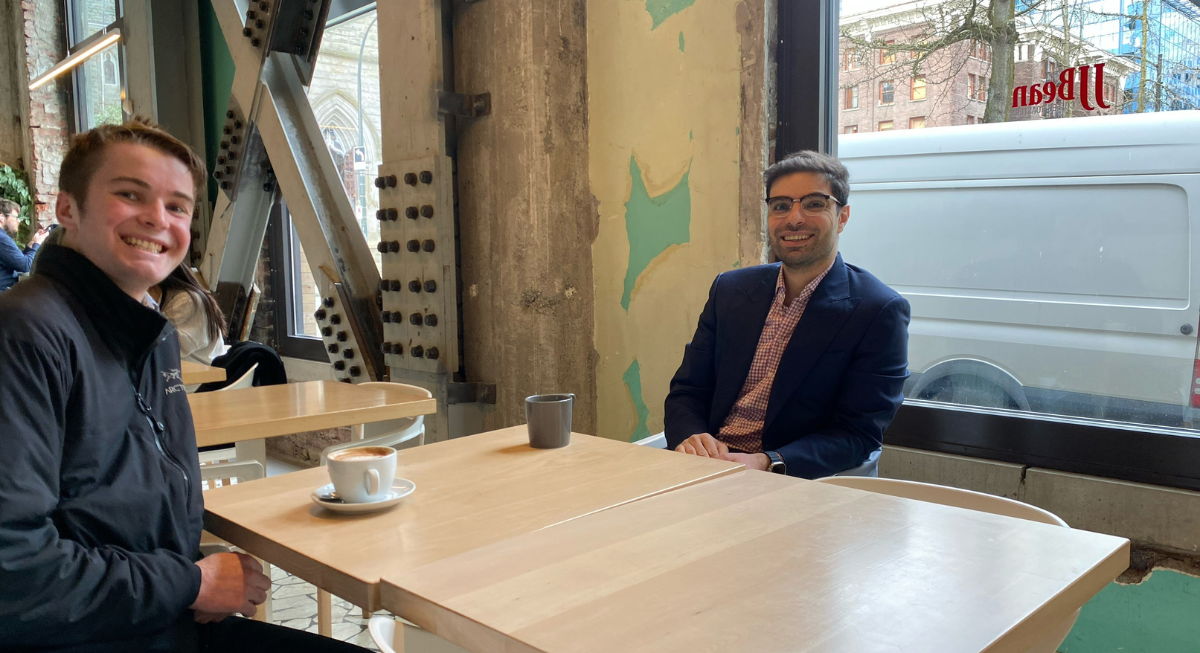The Telfer Executive MBA (EMBA) program at the University of Ottawa fosters leadership, collaboration, and strategic thinking through a team-based learning model which is an essential part of the program. This model mirrors the dynamic and often complex characteristics of a professional business environment. In this article, EMBA alumni Shayna Osterer and Kevin Tetreault share insights on the personal growth and career development benefits they realized through this team-based learning experience.
Simulating real-world professional teamwork

Team-based learning in the Telfer Executive MBA program closely replicates the teamwork found in professional environments. According to Shayna Osterer, EMBA 2023, the program creates situations where candidates must work with people they may not have naturally chosen to collaborate with. This mirrors the reality in most workplaces, where teams are often formed based on business needs rather than personal preferences.
In both cases, individuals must learn to communicate, collaborate, and solve problems collectively. “What is interesting about the teamwork in the EMBA program is that regardless of what you do in your professional life, we are all equals in the classroom and in our teams – there is no hierarchy, so we have to become comfortable with managing our team in some situations and being managed by someone else in the team in other situations,” shares Shayna. “This was a great learning opportunity for me because I am very comfortable leading, and I had to consciously remind myself not to take the lead - allowing others to lead as well. Some group members were not as comfortable with leadership roles in the beginning. Giving them a turn to lead the team, I could see the growth that occurred in everyone from the beginning of the program to the end.”
Kevin Tetreault, EMBA 2021, adds that teamwork in the program is reflective of real-world teams and project management. " The team-based learning wasn’t a dedicated course in the program, but a lot of learning happens as you try to navigate projects and deadlines with a group of individuals who all have strong minds and a sense of how things should be done. As it turns out, we had rotating leads for each of the projects in the program, and that person was accountable for the collective outcome. It’s a direct reflection of corporate project work—managing components, team members, and deadlines."
Learning through diversity
One of the most valuable aspects of the learning model is the opportunity to work with individuals from different cultural, educational, and professional backgrounds. Shayna highlights how her team’s diversity enhanced her learning experience: "We had a mix of different cultures in our team with international candidates from Vietnam and India and one person who worked in Nunavut, which brought unique perspectives to every project. This diversity enriched our group’s discussions, as we shared our views and contributed to problem-solving from various angles.”

Kevin agrees, noting that working in diverse teams challenged preconceived notions and offered invaluable learning opportunities. "In the EMBA program, I learned from people who had different strengths and experiences. For example, I’m not strong in math, but one of my teammates excelled in it, so I leaned on him for support."
This diversity also extends to different professional sectors, as each team brings together candidates from industries ranging, for example, from healthcare and government to startups and the military. Working in such varied teams fosters creativity, adaptability, and a broader understanding of how to approach complex business challenges.
Enhancing leadership skills
Both Shayna and Kevin emphasize how team-based learning has helped them become better leaders. Kevin was the youngest in his team and had the opportunity to learn from people who had worked in several careers and had a wealth of knowledge and experience to share. “This meant that when it was my turn to lead a project or an assignment, I was managing and leading a team of individuals who were older and more experienced than I was. It was fascinating and great learning for me as a leader.” He adds the importance of empowering others. "When you’re leading a project, you need to listen to everyone’s views but also trust the team's leader to make the final decisions. You might have a different approach as to how you think things should be done, but you have to respect the fact that they're leading this particular project. In my career now, I’m better at allowing others to lead and at respecting their decisions."
Shayna, who runs a coaching business alongside her consulting work, discusses how the EMBA’s team environment helped her develop strong leadership skills through the use of tools like the team charter. "The team charter helped us have difficult conversations in a respectful manner and gave us a framework for how we wanted to function as a team. It's something I’ve incorporated into my professional life," she explains. Additionally, the program encourages candidates to reflect on their personal strengths and areas for growth. Shayna reflects on how her team helped her channel her big-picture thinking and abundance of ideas by emphasizing the importance of prioritizing tasks effectively—a skill she now relies on daily.
Building cohesive teams

One of the key takeaways from the focus on teamwork in the program is the ability to create a cohesive and functional team. As Shayna notes, "Our team evolved over the 20 months we spent together. We became more empathetic towards each other, recognizing personal challenges, and we adjusted our communication styles accordingly." This mirrors how successful teams in the workplace operate, where understanding individual team members' strengths, needs, and personal situations is critical to overall success. “If someone has something stressful going on in their personal lives, it can alter how they behave or perform in their professional world. Understanding the individual gives us insights into how they like to work and how they need to be managed – some people need very little management; others need regular touchpoint meetings to help them stay organized and on track. It’s important to create a supportive environment so everyone on the team can provide their best work. Every situation calls for a thoughtful approach, recognizing that you’re working with people who have real needs. Being understanding and helpful is essential to fostering effective teamwork and meaningful connections.”
Kevin highlights how team-based learning helped him see the value of building diverse teams in his professional life. "I find that I'm more aware of people's strengths and the importance of bringing a variety of skills and personalities to a project to serve a client effectively. I never really put that much thought into it before I did the EMBA program, but now I pay a lot more attention to how I put together a team and who I include on teams.”
Career benefits of team-based learning
Ultimately, teamwork in the Telfer Executive MBA program translates into practical, career-enhancing skills. Shayna credits the program for helping her succeed as a consultant and business owner. “I had been thinking about an MBA for 20 years. Many of the positions I gravitated toward required an MBA, so it seemed like the natural next step. Over and above that, the program would give me the credentials I needed to go along with my professional experience and that was also a big reason for my decision to pursue it. Having completed the EMBA, the skills and knowledge I gained from the program have helped me significantly. In a professional environment, managers make a lot of decisions, but the EMBA teaches you how to make group decisions – ensuring everyone is on the same page before moving forward. Learning how to make group decisions is helpful to me as I work with other consultants and clients to deliver successful projects. I wouldn’t be where I am today without having done the program. Quite literally, my employer is a Telfer Executive MBA alumnus, and I was introduced to him by one of my professors. The program gave me the network and the skills I needed to succeed in my current role and beyond."
Kevin, too, recognizes the professional benefits of the program’s learning model. "I’m more confident in delegating tasks and allowing others to lead. The EMBA program taught me to trust the process and let people use their strengths to achieve collective success."
The team-based learning model in the Telfer Executive MBA program offers a powerful simulation of professional teamwork, equipping candidates with the skills necessary to lead, collaborate, and succeed in their careers. By working in diverse teams, sharing leadership responsibilities, and navigating complex projects, EMBA candidates are better prepared for the challenges of the current and future business world.











